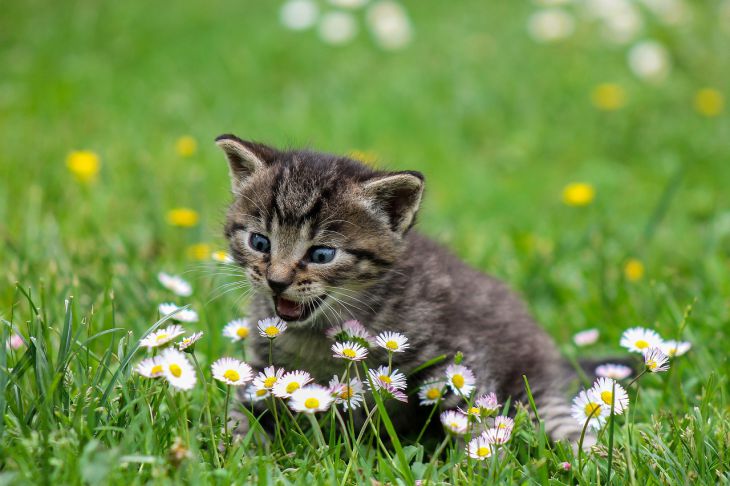Cats often exhibit behavior that can puzzle even the most experienced owners.
One of these mysterious habits is scratching walls.
This action may be irritating to owners, but for cats it is important.

Playing
Cats are natural hunters and love to play. Scratching a wall may simply be a way for a cat to entertain itself and get rid of excess energy. This is especially true if it has few toys or opportunities for interactive play.
Play is very important for cats as it helps them maintain their physical and mental health, so it is essential to provide them with an outlet for their energy.
To solve this problem, provide your cat with plenty of toys and play with them regularly. Offer different types of toys, such as balls, feather sticks, and interactive toys.
Set aside time every day for play, actively interacting with your cat using toys or even just your hands.
Territory marking
Cats have scent glands on their paws, and when they scratch or hit something, they leave their scent behind. This helps them mark their territory and communicate with other cats who may stumble upon their “messages.”
Marking is a natural behavior for cats and helps them feel safe. If your cat scratches the wall frequently, it can cause damage to the walls or furniture.
Provide your cat with scratching posts in various places throughout the house, especially near areas where your cat spends a lot of time.
This will allow her to mark her territory in a more acceptable manner while satisfying her scratching instincts.
Anxiety or stress
Just like humans, cats can experience stress or anxiety, so they may scratch a wall to relieve tension.
Changes in the environment, new people or pets, or even boredom can all cause stress in cats. It’s important to be aware of potential stressors in your cat’s life and take steps to minimize their impact.
Identify and eliminate any sources of stress in your cat's life. Maintain a stable environment and provide shelter or comforting aids as needed.
Create a safe haven for your cat by offering cozy hiding places, such as boxes, where she can retreat and feel safe. Consider using calming aids, such as pheromone diffusers or calming collars, to reduce your cat’s stress levels.
Attracting attention
If your cat notices that you are paying attention to her when she scratches the wall, she may continue to do it to get more attention. This is especially true if she associates this behavior with getting a treat, being petted, or playing.
While it is important to give your cat attention, increasing unwanted behavior can lead to problems.
Provide positive reinforcement for more appropriate behaviors, such as playing or using a scratching post.
When your cat starts scratching the wall, ignore the behavior and redirect its attention to a more appropriate activity.
Be sure to praise and reward her when she behaves well so that the cat understands that these actions are more likely to get attention.
Hunting instincts
A cat's predatory instincts may be triggered by something it sees or hears near the wall, such as a bug or small rodent. It may scratch the wall in an attempt to catch the "prey."
Keep your home pest-free and provide your cat with toys that stimulate hunting instincts. Offer toys that mimic the movements of prey to satisfy your cat's hunting instincts.
Stretches muscles
Cats love to stretch their muscles, and scratching a wall can be a great way for them to stretch their back legs. Stretching is essential for maintaining flexibility and muscle tone, and it can also help relieve tension and make you feel relaxed.
Offer your cat a high scratching post as an alternative way to stretch.
Encourage your cat to stretch during play by engaging her in activities that involve stretching or jumping.
Aggression
If a cat feels frustrated or threatened, it may scratch a wall to vent its aggression.
Recognizing and addressing the cause of your cat's aggression is important to her well-being.
Supervise your cat's interactions with other animals and provide her with a safe place to hide if she feels threatened.
If necessary, separate your cat from other pets during periods of heightened tension to prevent aggressive encounters.
Health problems
In some cases, wall scratching can be a sign of a health problem, such as arthritis, nerve damage, or even an injury. It is important to monitor your cat’s health and consult a veterinarian if you notice any behavioral changes.
Regular checkups with your veterinarian can help identify health problems early. Early intervention can make a big difference in your cat's overall health.
Boredom
Cats need mental stimulation, and if they don't get enough of it, they may scratch walls to entertain themselves.
Boredom can lead to a variety of unwanted behaviors, so it is important to keep your cat active and mentally stimulated.
Create a stimulating environment with different types of toys, scratching posts, and nooks to keep your cat entertained and mentally engaged.
In addition to toys, consider puzzle feeders to develop your cat's problem-solving skills.
Interactive games and regular new experiences will also help prevent boredom and keep your cat mentally active.
Behavioural problems
Some cats develop compulsive behaviors, such as excessive grooming or scratching, due to psychological issues. If the scratching seems excessive or obsessive, it may be worth discussing with your vet. They can determine the cause of your cat’s behavior and recommend treatment.
Habit
Sometimes cats just develop habits, and scratching walls can be one of them. If your cat has been doing it for a long time, it may be because she enjoys it and has no intention of stopping. While habits can be difficult to break, you can redirect your cat's energy.
Offer her new toys or activities that she can do instead of scratching the walls.
Stimulating opportunities will help your cat develop new interests and reduce its reliance on scratching walls.
Consistent redirection and positive reinforcement will help new habits stick over time.
Unmet needs
The cat may be trying to communicate that it has unmet needs, such as hunger, thirst, or a dirty litter box.
Establish a feeding and litter box cleaning routine to maintain consistency and prevent any misunderstandings.
Previously, we wrote about what to do if a hamster prevents you from sleeping at night.








